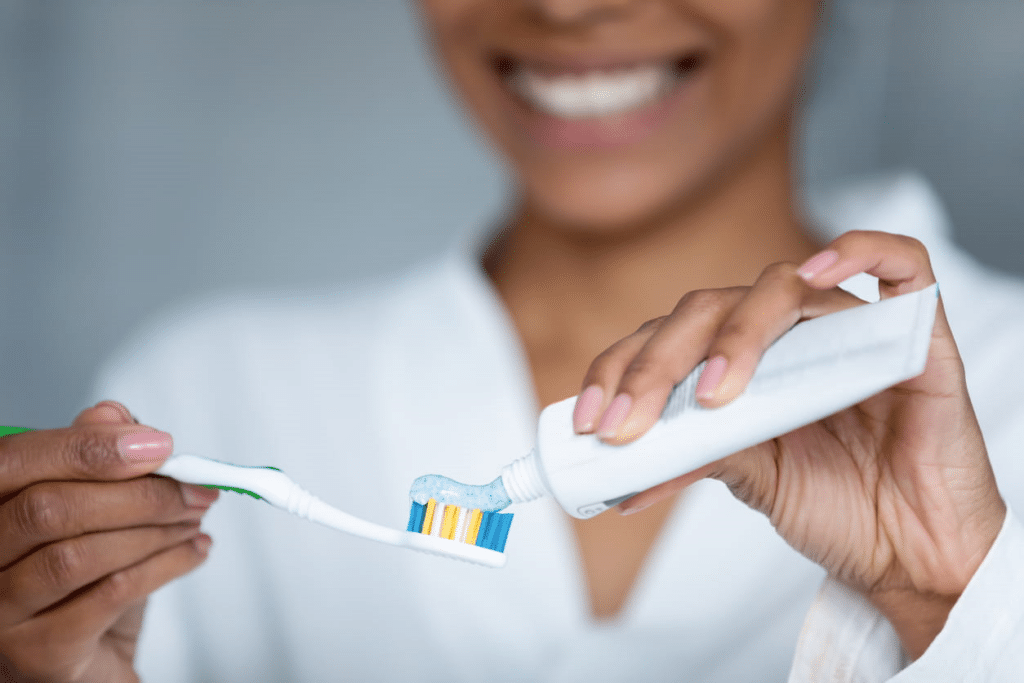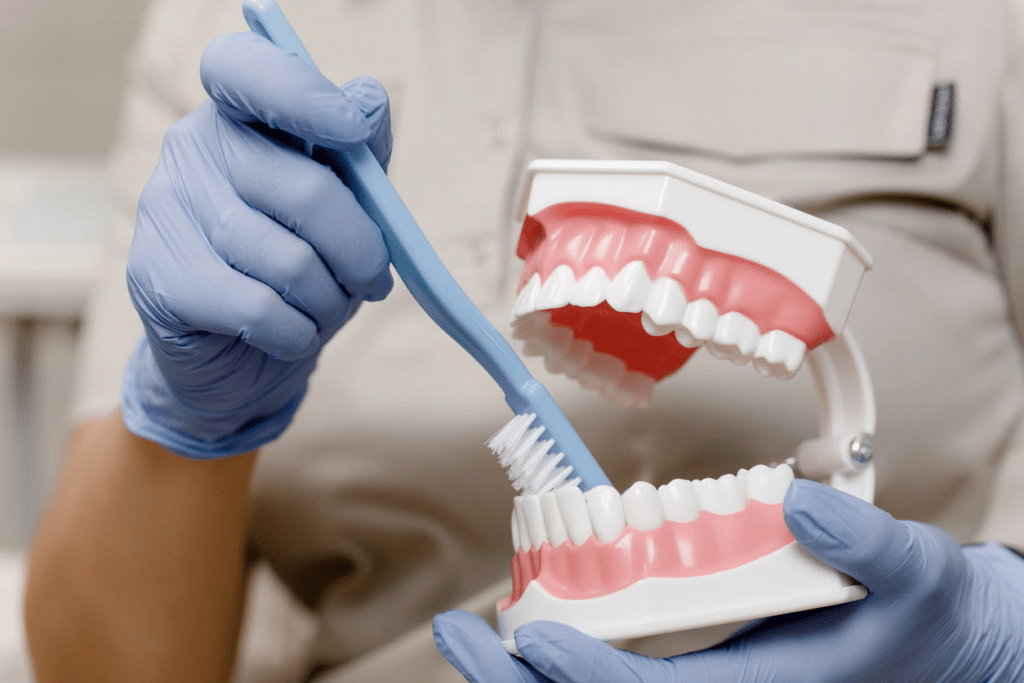Caring for your teeth can make the difference between a happy, healthy smile and a lifetime of dental health issues. Healthy dental habits include the following:
- Brushing: Brushing your teeth twice daily, including before bed removes debris and prevents plaque buildup
- Flossing: Floss daily and increase the number of times you floss if you have food stuck between your teeth
- Good toothbrush: You should use soft-bristle toothbrushes and replace your brush three or four times annually
- Fluoride toothpaste: Fluoride is a compound that protects teeth
Healthy dental habits also include regular dental cleanings. One benefit of regular cleanings is reducing your risk of periodontal disease.
What Is Periodontal Disease?
Your mouth contains tissue that covers the jawbone and roots of your teeth. This tissue, known as your gums, protects your teeth from harmful bacteria. Your gums also help maintain the position of your teeth.
Periodontal disease is gum disease. Also known as periodontitis, periodontal disease occurs when your gum tissue is infected.
Stage One: Gingivitis
Common signs of gum disease include swelling. Gingivitis can also cause painful or bleeding gums. Gingivitis occurs because of plaque buildup. Since plaque contains bacteria, the buildup leads to infection.
Stage Two: Periodontitis
Gingivitis affects your gums, but it’s periodontitis when the infection spreads beyond the gums to the periodontal ligament and jawbone. Signs of periodontitis include the following:
- Bad breath
- Loose teeth
- Receding gums
- Swelling
Stage Three: Advanced Periodontitis
Advanced periodontitis occurs when the infection causes permanent damage. Symptoms of advanced periodontitis include irreversible damage to the periodontal ligaments and jawbone.
What Causes Periodontal Disease?
Bacteria cause periodontal disease. When bacteria builds up in your mouth and is left unchecked, it can eventually destroy tissue and bone.
Debris from the food you consume combines with saliva to form plaque. When plaque hardens, it becomes tartar. Tartar is hard, making it more difficult to remove. Tartar can also spread below your gum line and spread more bacteria into your gums.
Can Treatment Reverse Gum Disease?
Treating and reversing gum disease is possible if you address it during the earliest stage. The most effective way to treat gingivitis involves dental cleanings and effective oral health care routines. You should brush and floss regularly, and you can also fight gingivitis by rinsing with a mouthwash designed to fight bacteria and protect your gums.
Do Regular Teeth Cleanings Prevent Periodontal Disease?
Investing in regular teeth cleanings is an effective way to prevent gum disease. Dentists have the tools and training to safely remove plaque and tartar without damaging your teeth or gums. Advanced dental cleanings, called scaling and root planings, eliminate sources of infection, repair roots, and prevent bacterial growth.
Is Brushing At Home Enough To Prevent Gum Disease?
Your oral health habits help you maintain good dental health. Brushing, flossing, and rinsing with mouthwash can reduce your risk of gum disease; however, dental checkups are a part of every good oral health plan. Your dentist can spot early signs of infection and provide prompt treatment to prevent it from spreading. It’s also impossible for people to be plaque-free from brushing and flossing alone. Dental cleanings remove the infection sources to prevent periodontal disease.
How Often Should I Get A Dental Cleaning To Prevent Periodontal Disease?
The standard guidance is to see your dentist once every 180 days. You should discuss your needs with your dentist because you may need to schedule as many as four dental cleanings annually to prevent gum disease.
What To Expect At A Dental Cleaning Appointment
Dental hygienists perform a routine exam before your teeth cleaning. A dentist will evaluate any signs of gum disease to determine if it’s safe to proceed with the cleaning.
The hygienist uses a scaler to remove any plaque and tartar on your teeth or along the gumline. After scraping your teeth, the hygienist brushes your teeth. They use a powerful toothbrush and gritty paste to clean your teeth thoroughly.
Your hygienist will also floss your teeth, have you rinse with a mouthwash with fluoride, and use a fluoride treatment to prevent cavities.
How To Maintain Dental Health Between Cleanings
In addition to healthy dental habits, such as regular brushing and flossing, there are some ways you can improve your dental health.
Change Your Diet
Reducing sugar intake can prevent or limit the amount of acid in your mouth. Since acid damages your tooth enamel and causes cavities, reducing acid buildup protects your enamel and prevents cavities.
To you reduce your sugar intake, you can reduce or eliminate your consumption of the following:
- Alcohol
- Fruit juice ice pops
- Hard candy
- Sugary drinks
Check labels to determine how much sugar foods contain, and strive to reduce your sugar intake. You can also brush your teeth about 30 minutes after consuming sugar to prevent acid production.
Be careful about using sugar-free alternatives as substitutes. Sugar-free beverages may also cause dental issues.
Dental Checkups
See your dentist twice annually for regular checkups. You should also schedule dental cleanings to prevent plaque and tartar buildup.
Manage Risk Factors
Some hereditary factors increase the risk of gum disease, and people are also at higher risk because of factors affecting their hormone levels, such as pregnancy, menopause, and diabetes. Having crooked teeth also increases your risk of periodontitis because crooked teeth can make it challenging to effectively clean your teeth.
Suppose you have risk factors that daily dental and dietary habits can’t address. You should see your dentist more than twice annually and invest in regular teeth cleanings.
Reduce Stress
Studies have established a connection between stress, depression, and anxiety, and periodontal disease. Exercise and meditation can reduce or manage your stress levels and help maintain your health.
Stop Smoking
Periodontal disease begins with an infection. Your body’s immune system mobilizes to fight off infections. Smoking strips your immune system of defenses, making it harder to fight those infections.
Sources:
Diabetes and Oral Health. (2023).
Gunepin, M. et al. (2018). Impact of chronic stress on periodontal health.
How Often (and When) Should You Floss? (2019).
Kubala, J. (2021). 7 Food That May Damage Your Teeth.
Smoking – effects on your body. (2023).
Sugar-Free Drinks Can Still Damage Teeth. (2015).

